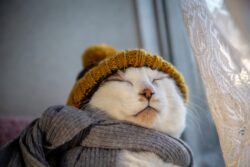They can wrap up warm, too (Picture: Getty Images)
The weather outside is frightful and, with many of us looking to cut back on our energy bills, the weather inside isn’t much better.
There’s naturally been lots of attention on keeping people warm this winter, with temperatures plummeting and energy bills rising.
But it’s important not to forget our pets as winter sets in. As Janine Pemberthy, a canine behaviourist and training manager at Battersea, says: ‘With the weather becoming much colder, it’s important that we do what we can for our pets to protect them against the chill this winter.’
This is why we’ve put together some top tips from animal experts to help ensure our pets are kept safe and warm in this cold weather.
Cats and dogs
Claire Stallard, an animal behaviourist at pet charity Blue Cross, tells us: ‘Most healthy dogs won’t struggle inside without heating on, but for older dogs (especially the ones with joint problems) and dogs with thin coats, then a coat or jumper may be a good idea – one that is comfortable to rest in too (no big buckles that might dig in). Blankets and duvets to snuggle up in will help, too.
‘Healthy cats are great at regulating their temperature usually, but you can also get microwavable pet-safe heat pads, such as SnuggleSafe, which are a good idea as they stay warm for hours.’
The RSPCA says that cats should also always have access to a warm indoor area, and your pet’s preferred sleeping spot should be dry, warm and sheltered from any draughts. The charity also advises against keeping dogs outside in any weather.
Make sure they’ve got plenty of cosy blankets (Picture: Getty Images/500px)
If you get your dog a coat, make sure they can still move comfortably in it, and that they still behave normally in it, doing things like going to the toilet as usual.
And, of course, if your pet comes in from outside went or snowy, make sure they’re thoroughly dried off as soon as possible.
Battersea recommends checking their paws and between their toes too to make sure there’s no salt or grit from the roads stuck on them, and look out for frostbite.
If they’d prefer not to go outside, don’t force them. Instead, playing with them indoors will both help give them some exercise and warm them up. The temperature of your house should also not drop below 10 °C.
The charity also points out that, just like in hot weather, you should never leave your pets in the car unattended. In the winter, temperatures can plummet in vehicles very fast, which can be dangerous.
Just a cosy little guy (Picture: Getty Images)
Rabbits and guinea pigs
‘Smaller pets can be bought inside,’ says Claire, ‘but the contrast in temperature can be dangerous, so it is better to provide them with loads of bedding/pet-safe heat pads or move into an outbuilding like a shed or unused garage, rather than bringing them inside the house.
‘Rabbits are usually fine with a few moderations if they’ve had time to grow their winter coats. Guinea pigs less so, but with care, they can be kept outside.
‘Hutches should be protected so wind, rain, snow or sleet can’t blow in. You can use weatherproof tarp or a robust waterproof cover to put over the hutch but make sure there’s still ventilation for your pets. They will also need a lot of extra bedding to keep them warm.
‘Cardboard is very insulating so make a good liner for hutches in the winter months. Add newspaper and then plenty of soft straw for them to snuggle and tunnel in.’
The RSPCA advises that you might want to move your rabbit indoors if temperatures go below freezing, and your guinea pigs if it drops below 15°C.
If they have to stay outside, make sure they’ve got loads of dry bedding and that their hutch is protected with insulating yet ventilating covers.
It should also have a sloped roof and should be raised off the ground at least four inches.
More: Lifestyle
It’s called fashion (Picture: Getty Images)
Birds and fish
Birds like to eat more when it gets cold to help them keep warm, so make sure they’ve got plenty of food and (not frozen) fresh water.
If you’ve got birds in coops, runs or aviaries, make sure they have plenty of dry, warm bedding, such as straw, and that their house is covered to keep out any snow, wind and rain.
If you’ve got a fish pond, the RSPCA says you need to check to make sure the surface isn’t fully frozen because this can cause harmful gas to build up underneath it.
Don’t smash through any ice or pour boiling water straight over it, because this can harm the fish.
Instead, take a pan of freshly boiled water and, being careful not to burn yourself, gently melt a hole in the ice by resting it on the surface.
Do you have a story to share?
Get in touch by emailing [email protected]
MORE : You could be eligible for £25 a day pay outs if cold weather stays
MORE : Rise in cruel ‘ear-cropping’: Puppy found with cropped ears after suffering illegal procedure
MORE : Tips for layering in the snow – and generally keeping warm this winter
Pets want to be cosy, too.





